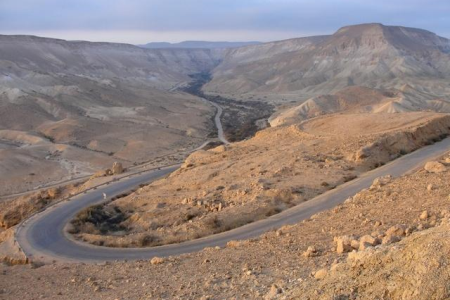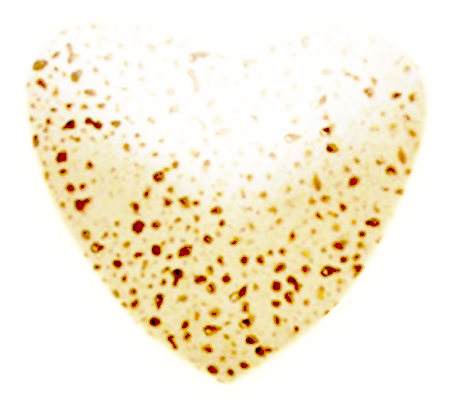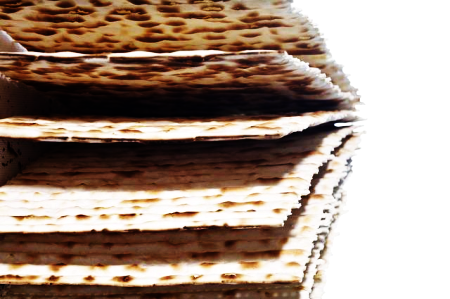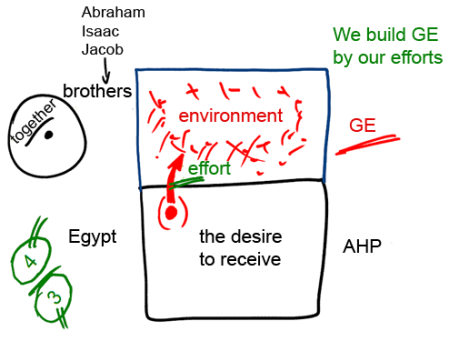Know the Law of Giving Like Abraham
When desires evolve in Nature, they create increasingly complex structures. Each new level rises to a higher degree of desire to receive when creatures of the current level join to form an aggregate of collaborators. By so doing, the creatures of the current (and presently highest) level create a system to which they can yield their self-interests, which provides them with sustainability and adherence to Nature’s law of giving. When this happens in humans, we, too, start from the smallest structure—a single person—and work our way toward increasingly complex societies. The only difference is that we must create these social structures that adhere to the law of giving by ourselves.
Abraham’s family was actually the first group to create that system, and then harness its members into a system whose parts were united by dedication to their host system. As Maimonides narrates, this initial system grew into a group. Yet, only in Egypt—when their number sufficed—did the system grow into a nation. When Moses brought Israel out of Egypt, the family of 70 that had gone into Egypt now consisted of several millions (there are many views on precisely how many came out of Egypt, but the common figures are between 2 and 6 million men, women, and children, excluding the mixed multitude).
Who Else Wants to Conquer Hatred?
Clearly, Moses’ job was far more challenging than Abraham’s. He could not gather the entire nation in his tent, as did Abraham with his family and few disciples, and teach them the laws of life. Instead, he gave them what we refer to as the Five Books of Moses, known in Hebrew as the Torah, which means both “Law” (of bestowal) and “Light.” In his books, Moses provided depictions of all the states that one experiences on the way to becoming like the Creator.
The first part of the way to emulating the Creator was to exit Egypt, venture into the Sinai Wilderness, and stand at the foot of Mount Sinai. According to ancient sources, the name, “Sinai,” comes from the Hebrew word, Sinaa (hatred). In other words, Moses gathered the people at the foot of Mount Sinai—the mountain of hatred.
To interpret the mountain-of-hatred allegory, Moses’ teachings showed the people how hateful they were towards each other, how remote they were from the law of bestowal. To reconnect with the law of bestowal, or the Creator, they united, as described by 11th century commentator and Kabbalist, Rashi, “As one man in one heart.”
Baal HaSulam elaborates on this process in his essay, “The Arvut (Mutual Guarantee),” where he explains that in return for their pledge to care for each other, Moses’ people were given the Torah. They attained the law of bestowal and obtained the light, the altruistic nature of the Creator. In Baal HaSulam’s words, “once the whole nation unanimously agreed and said, ‘We shall do and we shall hear,’ …only then did they become worthy of receiving the Torah, and not before.”
The First Mass Discovery of the Creator
Now we can see how important Moses’ mission was, and why free choice is a prerequisite to accomplishing it. The leaders of Abraham’s group were all family and were naturally united. But Moses had to unite a nation. To achieve that, the entire nation had to agree on a path. By making a free choice to unite, despite the evident egoism (allegorically described as “standing at the foot of Mount Sinai”), a nation was admitted into the law of giving. This was the first time in humanity’s history that people en masse attained the quality of the Creator, and from this point forward, choosing unity in the face of growing egoism will be the only way to achieve the Creator.
Continue reading “Why Kabbalah Can Help You Reveal the Creator Today”





